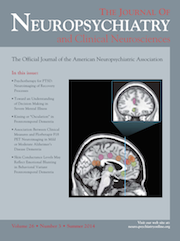Aripiprazole as Monotherapy at Bedtime Was Effective for Treatment of Two Cases of Obsessive-Compulsive Disorder and Insomnia
To the Editor: The augmentation of selective reuptake inhibitors (SSRIs) with aripiprazole (APZ) is reported to be effective for treatment-resistant obsessive-compulsive disorder (OCD). Conversely, there is only one report of APZ as monotherapy for treatment of OCD.1 The authors effectively treated two cases of treatment-resistant OCD with APZ as monotherapy at bedtime. Although APZ is reported to induce insomnia more frequently than somnolence, in our cases, APZ taken in the morning induced sleepiness in the daytime and taken at bedtime ameliorated the insomnia induced by OCD. Depending on sleepiness, changing the administration time of APZ induces a better outcome of OCD.
Case 1
A 37-year-old woman started to perform obsession and compulsive acts. She repeatedly checked the water faucet. She took 3-hour baths due to mysophobia. She took 3 hours to prepare each meal. She did not go to bed until 6:00 a.m. because she could not finish her housework. Her Yale–Brown Obsessive Compulsive Scale (YBOCS) was 32. At 41 years old, she was prescribed 300 mg/day fluvoxamine and took it for 6 years, then 50 mg paroxetine for the next 3 months, and then 100 mg sertraline for the last 6 months. These SSRIs did not improve her obsessive and compulsive acts. At 47 years old, she was prescribed 6 mg/day APZ with 100 mg sertraline in the morning, but she felt sleepy. After switching the APZ to bedtime, her obsession and compulsive acts were reduced, and she could get to sleep at 12:00 midnight and wake up at 7:00 a.m. After sertraline was stopped, her symptoms did not worsen for 6 months. Her YBOCS decreased to 13.
Case 2
A 27-year-old woman started to perform obsessive and compulsive acts. She repeatedly checked preparations for the next day’s housework. She sometimes did not sleep at all because she could not finish her housework. She washed her hands, again due to mysophobia. She spent 2 hours preparing each meal. Her YBOCS was 31. At 33 years old, she was prescribed 20 mg paroxetine for 1 month and then 25 mg sertraline for 1 month. These SSRIs did not ameliorate her obsessive and compulsive acts. She could not continue treatment because she felt nauseated and sleepy. At 34 years old, she was prescribed 3 mg/day APZ in the morning, but she felt drowsy. After switching the APZ to bedtime, her obsessive and compulsive acts were reduced, and she could finish her housework and sleep. Her YBOCS decreased to 15.
Discussion
Because the pathogenesis of OCD can be related to an imbalance between the serotonergic and dopaminergic systems,2 the combination of potent 5HT2A antagonism and 5HT1A agonism with a weak D2 blockade of APZ might have induced the better outcome in our cases. Although APZ taken in the morning induced sleepiness in the daytime, APZ taken at bedtime ameliorated the insomnia induced by OCD. Stip and Tourjman reviewed 11 studies on the effectiveness of APZ in patients with schizophrenia.2 APZ induced more insomnia (24.4%: 1097/4491) than somnolence (7.3%: 328/4491).3 APZ is reported to increase histamine release,4 and the increase of histamine may induce insomnia. The low histamine H1 and adrenaline α1 antagonism of APZ5 may produce somnolence. Depending on the sleepiness, changing the time of the administration of APZ may produce a better outcome.
1 : The use of aripiprazole in obsessive-compulsive disorder: preliminary observations in 8 patients. J Clin Psychiatry 2005; 66:49–51Crossref, Medline, Google Scholar
2 : Aripiprazole in schizophrenia and schizoaffective disorder: A review. Clin Ther 2010; 32(Suppl 1):S3–S20Crossref, Medline, Google Scholar
3 : Aripiprazole augmentation in treatmentrefractory obsessive-compulsive disorder. Psychopharmacology 2008; 197:687–688Crossref, Medline, Google Scholar
4 : Possible involvement of serotonin 5-HT2 receptor in the regulation of feeding behavior through the histaminergic system. Neuropharmacology 2011; 61:228–233Crossref, Medline, Google Scholar
5 : Aripiprazole, a novel atypical antipsychotic drug with a unique and robust pharmacology. Neuropsychopharmacology 2003; 28:1400–1411Crossref, Medline, Google Scholar



